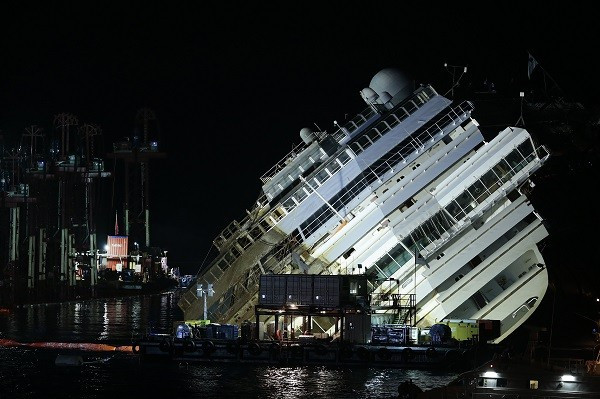Costa Concordia Disaster: How Italy Returned to an Even Keel after National Tragedy
Sinking of Concordia was unmitigated disaster - but the subsequent saga has actually raised Italian spirits

Great maritime disasters live long in the collective memory, and few have been more memorable (though mercifully less tragic in terms of loss of lives) than the running aground of the Italian cruise ship Costa Concordia in late January 2012 off the Tuscan island of Giglio.
The salvage operation, which began in spring 2012 under a joint venture firm called Titan Micoperi, culminated in mid-September with a complex operation to right and re-float the breached, listing hulk. Four hundred journalists covered the drama from the shoreline, and it made for gripping global TV coverage.
But what do the initial disaster, the subsequent salvage success, and the imminent criminal trials say about Italian society and the country's self-image? I was in Italy during the week of the operation, and followed it all closely.
The initial disaster and the surrounding circumstances had a grave impact on Italy's already battered self-confidence. The series of mistakes which led to disaster - the cavalier behaviour of Captain Franco Schettino in taking the vessel too close to the shore, his apparently hurried desertion of the ship, initial non-communication by the crew to panicking, mainly Italian passengers, and the confusion of the abandon-ship procedure - were made at a time of political tension and chronic economic difficulty.
The deepening Euro crisis had just engulfed the government of Silvio Berlusconi, and the last thing Italy needed was the spectacle of all the old clichés about the national character being paraded before the world's media: a cowardly commander, hysterical passengers, a botched rescue, and a noisy blame-game.
The American owners of Costa, Carnival Cruises, were appalled and angry about the disaster, and soon sacked or reassigned many of the senior crew and managers. Thirty-two people were left dead, and several bodies were (and remain) missing. Yet it seemed from Italian press coverage that the main issue was whether or not the captain had been too interested in his Moldovan girlfriend that evening to concentrate on what he was doing.
But then another story emerged. Reports began to emerge that, once Schettino realised what had happened (that the ship had hit the rocks, tearing a huge hole in the hull) he carried off quite a feat of seamanship in beaching the vessel so close to shore that the death toll was kept relatively low.
In addition the effective, even fierce, behaviour of the local Coast Guard commander, who ordered the captain back onto his ship in no uncertain terms (the broadcast recording is very vivid) did a lot to rectify not only the image of Italian seamen but also to make Italians feel that the world was not laughing at them but was actually applauding, as they themselves could, the behaviour of the Italian state's main representative. That is always a sensitive issue in Italy, where the state's shortcomings are so often at issue.
The long salvage operation and the associated, equally successful environmental damage-limitation efforts (to prevent maritime pollution from fuel oil and rotting food in the submerged part of the hull) have been jointly led by a South African and an Italian marine expert. But many of the operational staff have been Italian, from local firms and universities. Much of the local media coverage has reflected this.
The touch-and-go drama and ultimate success of the operation to right the ship ten days ago, using a technique called 'parbuckling', in essence hauling the huge vessel upright with cables and refloating her using giant sponsons, was hyped up by press coverage, but has also served to restore in Italian eyes the image of competence which the country craves - and not just in engineering terms.
The relief of the politically-embattled Prime Minister Enrico Letta was evident that night, when he received the joint leaders of the operation in his Rome office before TV cameras to congratulate them. Had the operation gone badly wrong, it would have had a serious impact not only on the recovery operation, but quite possibly on the current government's fragile position too, and would certainly have led to further national recriminations.
All is not yet over. The ship now has to be towed to a salvage yard, maybe in Italy, or maybe further afield (there was a polemic in Italy last week about avoiding notorious Third World sites) for breaking up, and there will be technical challenges implicit in that. Captain Schettino's trial for criminal negligence has just begun and though he is reportedly in a state of depression at his home, he is defending himself volubly in court.
Schettino's defence will force many Italians to relive the shaming moments of the initial accident. And as in so many Italian trials, the proceedings will probably drag on and be subject to repeated appeals, all in the glare of publicity. Most Italians (other than his immediate family and friends in Salerno) think the man christened 'Captain Coward' by the meida is a disgrace.
What the longer-term effect will be on the Italian tourist industry is hard to predict. Cruise bookings are already down because of the recession, and Concord has certainly suffered seriously from the reputational damage of the Costa loss. But the annual numbers visiting Italy are enormous, and much of the 2012/3 visitor traffic, especially to the great cities, will have been unaffected. An eventual full salvage success will surely help memories to fade.
Charles de Chassiron is a former diplomat who served in Italy for nearly a decade and is currently chairman of the British-Italian Society
© Copyright IBTimes 2025. All rights reserved.





















